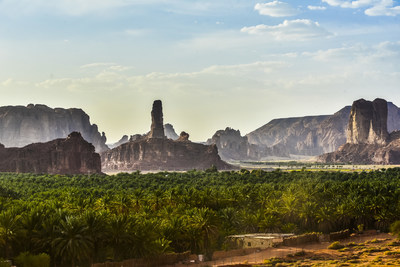
MARSEILLE, France, Sept. 9, 2021 /PRNewswire/ -- Another milestone in the ambitious nature and conservation plans for AlUla, a significant heritage and culture site in north-west Saudi Arabia, has been achieved with a three-year cooperation agreement between the Royal Commission for AlUla (RCU) and the International Union for Conservation of Nature (IUCN).

The vast desert region has been home to civilisations for millennia, from ancient Arabian tribes and Kingdoms to settlers from near and far drawn to the landscapes of lush green oases, vast mountains and valleys. However, recent decades have seen factors of desertification and climate change affect the natural balance of the ecosystem.
The conservation team at RCU has developed the building blocks of a programme to regenerate nature at AlUla and redress the balance. The overall project has a goal of converting 80% of AlUla into nature reserves, in line with the Saudi Green Initiative, which aims to improve quality of life and protect the future by increasing reliance on clean energy.
One of the centrepieces of the regeneration effort is the emergence of the Sharaan Nature Reserve, spanning 1,560 square kilometres. The reserve's perimeter fence is complete, and the visitors centre and wildlife breeding centre are to open by early 2024. The reserve will follow a dedicated masterplan in which the primary objectives are to restore and conserve a healthy desert ecosystem, with its natural complement of characteristic desert flora and fauna, including the breeding and reintroduction of the Arabian Leopard and other native species.
Other plans include a long-term conservation strategy for the Khaybar area; a fauna and flora inventory; creation of a nursery to provide 56 plant species for landscaping and ecological restoration; and activation of policies relating to irrigation, use of local plants and sustainability.
The cooperation agreement was signed by The Royal Commission for AlUla Governor His Highness Prince Badr bin Abdullah bin Farhan Al Saud and the IUCN Director General Dr Bruno Oberle. The announcement of the agreement coincides with RCU's participation in the IUCN World Conservation Congress at Marseille, France from September 3-11.
The agreement will greatly assist RCU in applying a scientific perspective to issues of nature conservation and sustainable development, and to define relevant projects, activities and financial agreements as it regenerates a vast expanse of north-west Saudi Arabia centred on AlUla County. RCU's vision for nature focuses on the restoration of wildlife and their habitats in a sustainable way that diversifies the economy and provides opportunities for the local community.
Commenting on the agreement, Amr AlMadani, the CEO of the Royal Commission for AlUla, said: "Just as nature is an ecosystem, so too is international conservation. The development over the next three years of a symbiotic relationship with IUCN will help us carve out an increasingly active place in this ecosystem. It will help us fulfil our plans by harnessing the expertise of the global conservation community to achieve our vision."
This year's IUCN congress is the first at which RCU is participating, with a presence including workshops and a local action pledge. Saudi Arabia has been an IUCN member since 1981.
The 10 areas of cooperation under RCU's partnership with IUCN are:
- Enhancing support for effective and equitable governance of natural resources.
- Preserving and conserving the integrity of nature.
- Sharing solutions to overcome challenges.
- Supporting the implementation of protected areas and natural heritage management through the IUCN's Green List of Protected and Conserved Areas.
- Supporting the implementation of wild nature restoration and management.
- Developing education and capacity-building initiatives on conservation and sustainable management of natural resources.
- Providing capacity-building in the field of sustainable tourism development and management.
- Organising and hosting joint expert meetings, including international experts, IUCN's Commission members and regional and international members of IUCN.
- Promoting sustainable ecotourism for AlUla in the IUCN World Conservation Congress through sponsorship and participation opportunities.
- Any other areas agreed upon by the parties.
About AlUla
Located 1,100km from Riyadh in north-west Saudi Arabia, AlUla is a place of extraordinary natural and human heritage. The vast area, covering 22,561km², includes a lush oasis valley, towering sandstone mountains and ancient cultural heritage sites dating back thousands of years.
The most well-known and recognised site in AlUla is Hegra, Saudi Arabia's first UNESCO World Heritage Site. A 52-hectare ancient city, Hegra was the principal southern city of the Nabataean Kingdom and is comprised of nearly 100 well-preserved tombs with elaborate facades cut into sandstone outcrops. Current research suggests Hegra was the most southern outpost of the Romans after conquering the Nabataeans in 106 CE.
In addition to Hegra, AlUla is home to a series of fascinating historical and archaeological sites such as: an Old Town surrounded by an ancient oasis; Dadan, the capital of the Dadan and Lihyan Kingdoms, which is considered one of the most developed 1st-millennium BCE cities of the Arabian Peninsula; thousands of ancient rock art sites and inscriptions in Jabal Ikmah; and Hijaz Railway stations.
Note to editors:
It is always AlUla / not Al-Ula
About the Royal Commission for AlUla
The Royal Commission for AlUla (RCU) was established by royal decree in July 2017 to preserve and develop AlUla, a region of outstanding natural and cultural significance in north-west Saudi Arabia. RCU's long-term plan outlines a responsible, sustainable, and sensitive approach to urban and economic development, that preserves the area's natural and historic heritage, while establishing AlUla as a desirable location to live, work, and visit. This encompasses a broad range of initiatives across archaeology, tourism, culture, education, and the arts, reflecting a commitment to meeting the economic diversification, local community empowerment, and heritage preservation priorities of the Kingdom of Saudi Arabia's Vision 2030 programme.
Photo - https://mma.prnewswire.com/media/1611871/AlUla_RCU_agreement_IUCN.jpg


